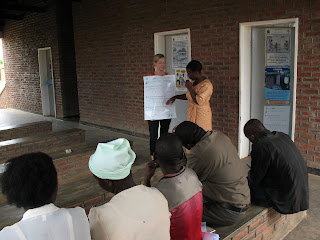The Connecting Classrooms program targets particularly under-resourced and isolated schools within the West Bank. For the pilot phase of this program, schools must already have computer labs; but they do not yet need to be connected to the internet--and it seems like none of them are. The fact that UNICEF will sponsor their school's internet connection for the duration of the program is the only concrete, measurable incentive that any of the schools or teachers can expect. And with this connection comes increased work for the technology teacher, increased responsibility on behalf of the school (to the parents and the surrounding community) and the task of learning how to use new web technologies and new teaching strategies to integrate a technical program into an already crowded curriculum.
This proposal offers lots of room for protest and objection. Indeed, in other countries and educational contexts, the invitation to participate in Connecting Classrooms has been met with resistance, bargaining or hesitance. The several dozen Palestinians who have spent several hours in explanatory meetings--discussing the purpose of the program and viewing the technology--have, in contrast, asked superb questions about the practical matter of joining this initiative and then shown great enthusiasm.
 The headmistress and the technology teacher of El Shawawreh Girl's School (on a Bethlehem hilltop) joke, in the computer lab, with a representative from the local Dept. of Education.
The headmistress and the technology teacher of El Shawawreh Girl's School (on a Bethlehem hilltop) joke, in the computer lab, with a representative from the local Dept. of Education.
Students at El Shawawreh Girl's School play in the courtyard visible from the computer lab.
The project is already generating considerable regional interest. Participants and likely partners hope to scale up the project to include thousands of young people from Jordan, the Iraqi Diaspora and other Middle Eastern nations. Also, there is optimism that simultaneous Arabic to English and English to Arabic translation applications will soon enable students from the Middle East to interact synchronously with large communities of students from Africa and other parts of the world.
Stay tuned to learn more about this project's growth and trajectory.


























